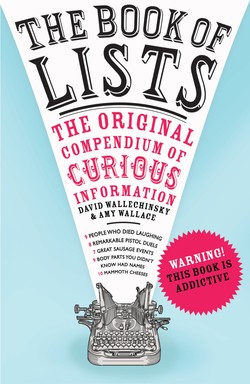Читать книгу The Book Of Lists - David Wallechinsky - Страница 48
На сайте Литреса книга снята с продажи.
Richard Eyre’s 9 Favourite Theatre Productions
ОглавлениеOne of the world’s most respected directors for both stage and screen, Richard Eyre has had a long and distinguished career in the British theatre. For nine years he was artistic director of the National Theatre, with overall responsibility for a succession of award-winning productions of shows as different as Guys and Dolls and The Oedipus Trilogy. Richard Eyre, who was knighted in 1997, is also a film director whose 2001 movie Iris, about the novelist Iris Murdoch, was much acclaimed.
At the time I saw these productions I thought that they were inspirational and exemplary – perfect syntheses of writing, acting and design. They were truly theatrical, in the sense of exploiting the theatreness of theatre.
1 WEST SIDE STORY (1959) by William Shakespeare, Arthur Laurents, Stephen Sondheim and Leonard Bernstein; directed by Jerome Robbins Hit me like a thunderbolt – the music, choreography, the energy and the beauty. I had no idea theatre was capable of such things.
2 THE WARS OF THE ROSES (1963) by William Shakespeare; directed by Peter Hall Made me see that Shakespeare could be contemporary and historical, funny and humane, entertaining and educational.
3 CORIOLANUS (1965) by William Shakespeare, adapted by Brecht; directed by Bertolt Brecht and the Berliner Ensemble Brilliantly lucid and distilled – everything to the point and the point was political but not polemical.
4 SAVED (1965) by Edward Bond; directed by Bill Gaskill Like a knife thrust: violent, painful, ascetic, spare – and beautiful.
5 THE CHANGING ROOM (1971) by David Storey; directed by Lindsay Anderson Ensemble detail and harmony: a celebration of beauty, sport, manual labour which now seems as remote as the pre-Raphaelite movement.
6 SUMMERFOLK (1975) by Maxim Gorki; directed by Peter Stein Exquisite, poetic.
7 THE MAHABHARATA (1985) by Anon; directed by Peter Brook The elements of the production were the elements of life – earth, fire, air and water; it had the brilliance and bravura that could have been attention-seeking were it not obviously the consequence of trying to find the most expressive way of telling the story.
8 THE DRAGON’S TRILOGY (1987) written and directed by Robert Lepage A perfect blend of art and architecture, music, dance, light, dialogue and movement; the writing – and the meaning – was in the whole event.
9 FUENTE OVEJUNA (1989) by Lope de Vega; directed by Declan Donellan A sinuous energy, truth and freshness that defined what every production of every classic should aim for.
